Kuzumochi, a cool sweet summer dessert
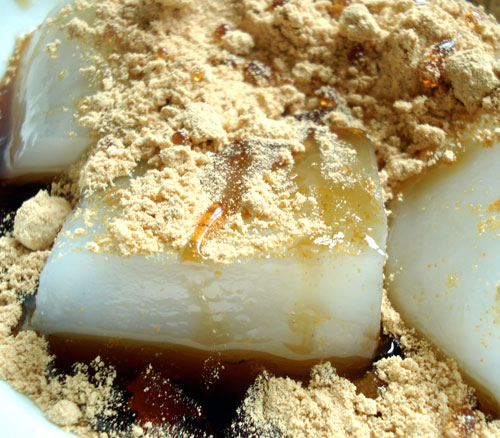
I wrote about the use of kuzu powder in the _goma dofu_ (sesame tofu) recipe. This time it's a very traditional, simple sweet dish using kuzu.
Kuzumochi are sticky 'mochi' cakes made with just kuzu powder, sugar and water. The texture is somewhere in between gelatin and mochi made from rice flour - wobbly but not too sticky. It's traditionally served chilled, so it makes an interesting, gluten free (and vegan) summer dessert.
Recipe: Kuzumochi
- 100g (3 1/2 oz.) kuzu powder (you really can't substitute anything else here, e.g. arrowroot or cornstarch - neither have enough body)
- 50g (1 3/4 oz.) white sugar
- 500ml (2 1/2 cups + 2 Tbs.) water
Mix together all the ingredients in a small pan. It starts out as an opaque white liquid.
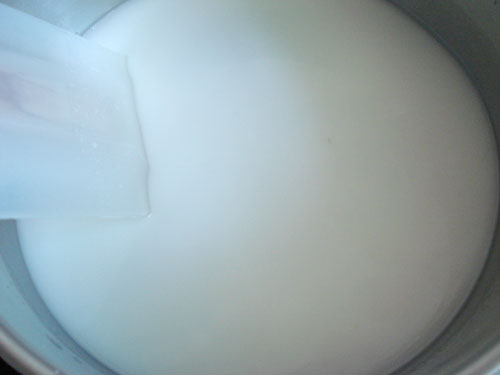
Heat over medium-low heat, stirring consistently. As it heats up, it will start to clump up. Keep stirring.
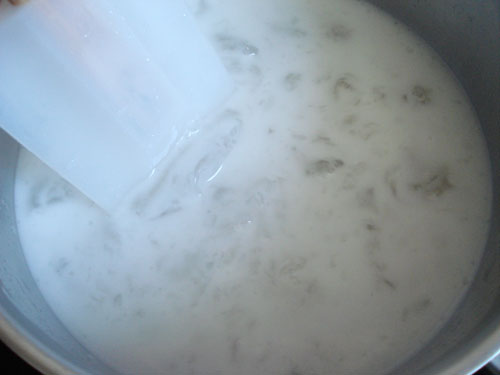
It will get more translucent and clumpy. Keep stirring quite vigorously.
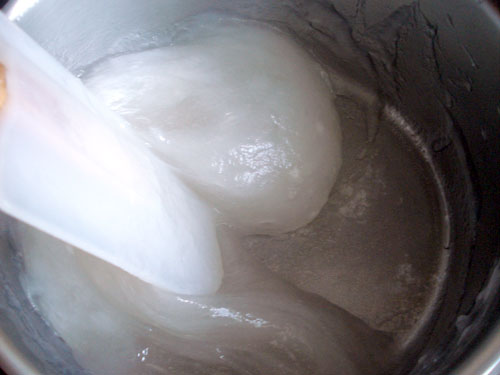
When it turns transclucent all over and quite thick, and clears the bottom of the pan, it's done.
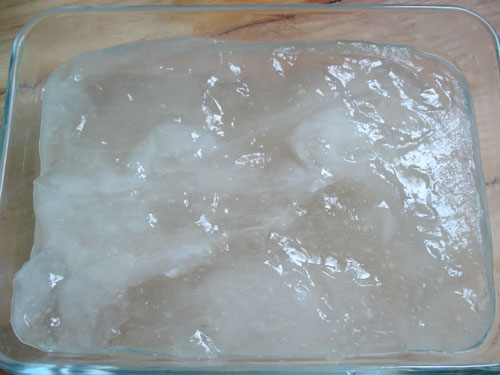
Wet the inside of a square container, and pour in the goo. Smooth out the top as well as you can with a wet spatula. It will be quite clear when hot, but will get more cloudy white as it cools. Let it cool down to room temperature, then refrigerate for at least an hour, or until completely cold.
Take it out of the container (it will slip out easily) and cut into cubes.
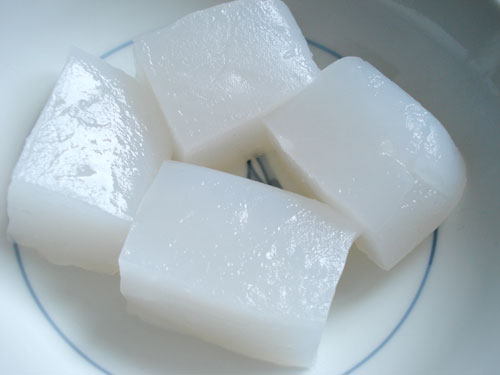
The traditional way to serve kuzumochi is with plenty of molasses or black sugar syrup and kinako, toasted and ground soybean powder, as in the top photo. I like it with lots of kinako. (If you don't have molasses, dissolve 1 cup of dark brown sugar in 1/2 cup of water.)
Since the kuzumochi is mildly sweet and quite bland, you can try all kinds of toppings. Try some fruit preserves, fresh fruit with honey or syrup, even condensed milk and strawberries.
If you enjoyed this article, please consider becoming my patron via Patreon. ^_^

 Welcome to Just Hungry, where we serve authentic Japanese recipes and more! I'm
Welcome to Just Hungry, where we serve authentic Japanese recipes and more! I'm 














Comments
Mei Ying
30 May, 2008 - 14:52
Permalink
for the sauce
can we use palm sugar instead for the sauce? and also, perhaps this is only my wild imagination but i think these little kuzumochi(s) goes really well with mitarashi dango's sauce...
Hannah
30 May, 2008 - 16:14
Permalink
Thank you!
Thank you so much for this recipe! I just adore kuzumochi but didn't even think about making it myself- It's been years since I've had some, but I can't wait to "revive" it as a summer treat this season. :)
Mother Bliss
30 May, 2008 - 19:43
Permalink
Just the push I needed
I've been thinking about making warabi-mochi for some time now. I think it's real similar to kuzu-mochi. I've already bought the warabi-flour and kuro-mitsu, but haven't made it yet since I was unsure of the process. Thanks for providing pictures, I think I'll give it a try this weekend. Love your blog, keep up the great work. I love your Japanese cooking and helpful info! Sincerely, a Japanese girl living in the mtns of So. Cal, USA.
maki
30 May, 2008 - 21:51
Permalink
Mei, my instinct tells me
Mei, my instinct tells me that mitarashi sauce wouldn't fit too well, since the sauce is best when it's a bit warm, and the kuzumochi are best when they are chilled. But you could give it a try for sure! Palm sugar should be fine.
Hannah, you're welcome! :)
Mother Bliss, warabi mochi sounds great! I wish I could get some warabi powder here.
ghanima
30 May, 2008 - 23:51
Permalink
Very familiar
This seems an awful lot like the Filipino dessert, puto, but more gelatinous. Still, I bet they end up tasting fairly similar.
Steph
31 May, 2008 - 04:46
Permalink
Oooo
Looks tasty! Thanks for the recipe :) I'm going to make this as soon as I find kuzu powder x.x Shouldn't be too difficult. The texture of kuzumochi looks so good ^^
Ision
31 May, 2008 - 06:29
Permalink
thankyou thankyou thankyou
Hey there, this site is fantastic! the way you describe the recipies are so easy to follow, especially with step by step pics!!
A friend led me here and now I am an avid reader as I used to live in Japan and LOVE the food. The great thing about living in Sydney Australia is we can get almost everything here..
Kuzumochi, here I come!
Fran
31 May, 2008 - 11:25
Permalink
Also looks very familiar
My mother is from the Micronesian island of Kosrae, which was governed by Japan before WWII. Now I know the origin of one the desserts they make for special occasions. They use tapioca starch for a similar dessert and top it with a caramelized sugar and coconut milk mixture.
Monavie
1 June, 2008 - 19:38
Permalink
kuzumochi
I absolutly love preparing this dish. I think its the "goo" that makes it so fun for me.
Jeanna
4 June, 2008 - 00:47
Permalink
Your website makes me miss
Your website makes me miss my mom's cooking! I can't wait until I go home in September, and she'll make me mochi and tempura and red bean/coffee gelatin dessert.
She just got back from Japan a few weeks ago, and she brought osenbei and shumai and ramune MMMMMMMMMM!!! And those Hato cookies from Kamakura since she's from Ofuna.
Can't wait to get home and show my mom all of these recipes. Your recipes rock!
Jackie
21 July, 2008 - 08:26
Permalink
Awesomely
I have always wanted to cook stuff like this...and me and some friends are planning to open a cafe with japanese treats and stuff. Its gonna be so cool if we get it started. Thanks again ^-^
maki
21 July, 2008 - 14:43
Permalink
If you do open the cafe, be
If you do open the cafe, be sure to drop me a note about it!
yannie
22 August, 2008 - 15:41
Permalink
mochi
Hi Maki, Ive been reading your site for a while and its been a bible for my bento and Japanese cooking XD Thanks so much for keeping this site and Just Bento they really make my day!
I have a problem with my daaifuku/mochis T_T. Ive always made mochi with chinese glutinous rice flour and the textures been fine but ive heard real mochi skin should keep in the fridge and freezer fine and should still taste ok afterwards but i couldnt do it with mine.
So then I especially bought a pack of mochi flour from the Japanese grocery store labelled "mochiko" and tried to use it like many recipes have taught (cooking it in microwave with water and stirring until elastic, then cut and roll in cornstarch).
However, when i did, the flour texture and appearance ended up like the kuzu powder did; it was white at first then turned translucent and ended up jelly. I also noticed that the recipe on the packet the directions were exactly as what you have here to make kuzumochi (cooking it then pouring it in a pan to cool and cut into blocks).
What is the correct flour to use for daaifuku? And what directions should i follow to make them? Should daaifuku skin turn transparent during cooking?
Puzzled + craving daaifukus,
Yannie
maki
25 August, 2008 - 13:57
Permalink
yannie, most Japanese
yannie, most Japanese mochi-based desserts are made with a dough called gyuuhi, or a variation of it. It's usually made with a mixture of medium-grain rice flour made from standard Japonica rice (the kind you use for everyday eating) called joushinko or joshinko, and short grain or sweet/glutinous flour or mochiko. You can make daifuku dough with all mochiko, but you may have to adjust the amount of water. If you see the yatsuhashi dough recipes (there are two, one for all mochiko and one for a mixture of joushinko and mochiko. The consistency should be right for making daifuku. Rememeber also that daifuku gets its white appearance from a generous dusting of katakuriko or potato starch flour - you can substitute cornstarch for this. HTH!
shuku
22 April, 2009 - 00:27
Permalink
Re: Kuzumochi, a cool sweet summer dessert
Thank you for this lovely dessert recipe! Do you have more recipes like this (or Japanese sweet shop recipes)? Most of my Japanese cookbooks rarely discuss desserts; why is that? So, I am really pleased that you have presented this kuzumochi recipe :)
Chana Adar
11 June, 2009 - 23:07
Permalink
Re: Kuzumochi, a cool sweet summer dessert
Maki, I enjoy Just Hungry so much. About the kuzu. I am so happy to learn more here about how to use it. The photos and texts are wonderful! I have been using kuzu because this root is very healthful and soothing, too. Thanks, Chana
bellagatta
23 October, 2009 - 18:17
Permalink
Re: Kuzumochi, a cool sweet summer dessert.....SWEET memories
THANK YOU~for this easy recipe. Came out perfect and it was very easy to find all the Japanese ingredients. I am Lucky we have so many well stock Japanese supermarkets. ( LA~ OC Calif ). I made this for my Japanese friends and they loved it. Very very easy to make. I cut kuzumochi with a flower cookie cutter, it looked very pretty and was very tasty~ I have made a few of your desserts and never had a problem with any of the recipes. I lived in Kyoto for a few years and started to miss japanese desserts. The dango recipe posted on your site was so easy to make that most of my friends know all about the dangos from kyoto that were wrap in bamboo leaves~ once a month they eat some kind of dessert that I made from 'JUST HUNGRY" !!
Thanks again for your generous time makind this site...this brings sweet memories from Japan!!
Franzi
8 June, 2010 - 10:45
Permalink
Re: Kuzumochi, a cool sweet summer dessert
Hi Maki,
I regularly read your blog(s) and I'm especially thankful for your detailed comments on Japanese cooking.
I tried several of your recipes and they turned out pretty well. (I must admit that it is hard for me to compare it to original Japanese food since I've never been to Japan. Nevertheless it tastes great. I like those rather decent flavors.)
Unfortunately as I tried to make Kuzumochi today the whole "dough" didn't turn out white/translucent but pink/brown and translucent. Is that ok? I think as it cooles the color will stay... Is there maybe something wrong with the Kuzu-ko I used? What do you think?
At least, what I stole out of the pot did actually taste really good. So I hope it is just a problem of the colour.
Greetings from Germany
Franzi
maki
8 June, 2010 - 10:54
Permalink
Re: Kuzumochi, a cool sweet summer dessert
Hi Franzi, I'm guessing that the kuzu powder you have is not refined enough (is the powder itself white? It should be really snowy white). If it tastes good though it should be fine!
Chibi Girl
19 July, 2011 - 13:49
Permalink
Re: Kuzumochi, a cool sweet summer dessert
Hi there! I live in Scotland it's proving very difficult to find Kuzu powder! When I google it, it often comes up with 'Kudzu' and it's often tablets it advertises! There are no asian grocery stores near me, is there a website you would reccomend buying it from? Also, are kuzu and kudzu the same thing? Thanks!
Akari
2 June, 2012 - 22:46
Permalink
Re: Kuzumochi, a cool sweet summer dessert
Can I get kuzu powder in the United States? Can I also make it green tea flavored do you think? I have dried (I think) green tea flavored warabi-mochi that were cut into mini cubes to serve after our main meal in the restaurant. This sounds similar. Please reply soon! ^^